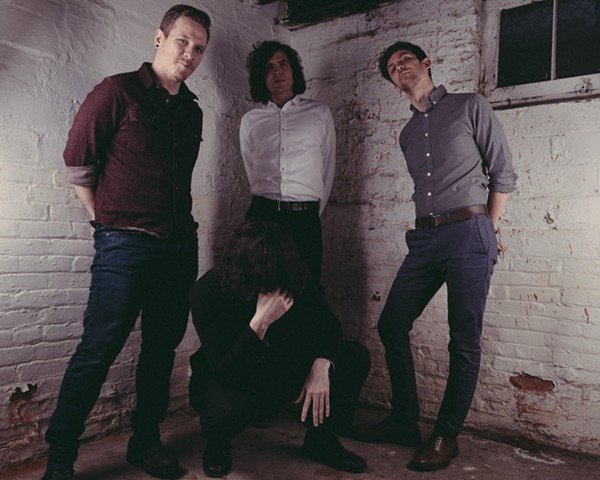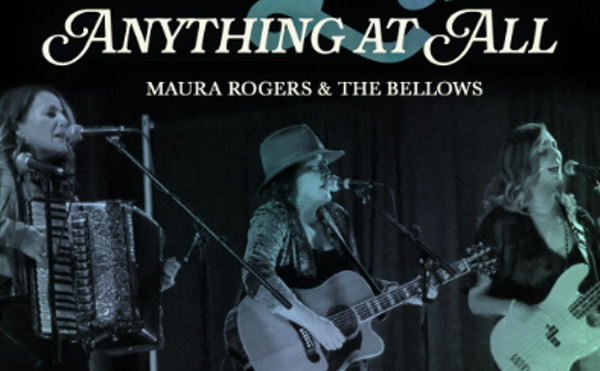Local Rockers King Buu Show Off Wicked Sense of Humor on New Album
By Alisa Manna on Tue, Jul 3, 2018 at 8:43 am
[
{
"name": "Ad - NativeInline - Injected",
"component": "38482495",
"insertPoint": "3",
"requiredCountToDisplay": "5"
},{
"name": "Real 1 Player (r2) - Inline",
"component": "38482494",
"insertPoint": "2/3",
"requiredCountToDisplay": "9"
}
]
Transcending genres, King Buu’s new album, Songs from the Black Jacket Lounge, fuses bleak and sleazy vocals, aggressive ballads and dead tones to create a demented take on a garage rock album. The local band’s first full-length features abrasive storytelling, strung-out feedback and primal blues and rockabilly licks knotted with blistering bass and murderous drum beats at an unrelenting pace, showcasing the group’s wicked sense of humor and love for the abnormal.
The self-released album will be available on cassette tapes and handmade CDs. Each CD and its case will be hand-crafted by the band, including a poster as the cover, games, puzzles and fictionalized facts or misinformation about the members.
Other oddities and personalized “collectibles” will also be available to purchase at the official album release show, which takes place at 9 p.m. on Friday, July 13, at The Happy Dog. The show will also feature the Dreemers and An American Astronaut.
Formed in 2016 by singer Mike Madgar and guitarist Cameron Milani, the band, which also includes bassist Erik Marsh and drummer Wesley Who, tackles death, addiction, horror and science fiction while incorporating pop tunes to create what it calls “modern warehouse rock.”
The band released its first EP, Hold Onto Your Butts, on Valentine’s Day of 2017, but instead of building off the four-track debut, King Buu wrote entirely new music for a full-length album.
“Those songs had run their course,” Madgar says one recent evening from a room in his house that he calls the Black Jacket Lounge.
The 10-track Black Jacket Lounge is a homage to the band’s lair and features songs about tongue-in-cheek observations of violence, media and drugs as well as their impact on today’s culture.
“The Black Jacket Lounge is a room in [my] house — [it's] an absurdist spot where people inevitably tend to hang out, ponder strange thoughts and stories,” Madgar says. “Most of our songs are strange stories with musical accompaniment.”
He says the album covers an array of topics, both surreal and “entrenched in some kinda realism,” but, for the most part, he says the lyrics start as short stories and then transform into traditional songs.
“The lyrics are nonsensical,” Madgar says. “I wouldn’t think on them too, too deeply.”
However, he said there are concrete themes like loss of innocence, depression and feeling lost in your own skin.
“Walking Alone” is about a trip to the electric chair; “And Away” details what it’s like to return to a place from the past and realize you’re detached from the people and lack nostalgia; and “Me on the Run” is about trying to change your image for something better, cooler but then realizing you never can outrun who you truly are.
Revamping the California beach sound, the revved up and chaotic “Kinky Feeney (Endless Summer)” deals with a person losing his or her mind before walking off into the middle of an ocean. Following a similar note, “Lights Out” comes off like a surfy Jay Retard while unfolding into a crashy, thrashy story about getting lost in a graveyard.
Then, there’s “Sticking Around,” an oddly therapeutic track that begins with people watching a public hanging before transitioning into a prom ballad, in which the dead person confesses his love to an earth-bound angel; the song then turns to guttural screaming and chaos.
“What’s a song about dying if it doesn’t go to hell?” Madgar says.
“Done Dayz” is an old King Buu song written around Marsh’s opening bass line and modeled after a cuckoo clock. The song, however, is about a person blowing his or her head off and ending up in the devil’s crosshairs.
“I don’t think there’s a single positive song on the album,” Madgar says, “but you wouldn’t know that because the music doesn’t embody that tone.”
Influenced by Bill Haley & His Comets and savage crime stories, “I’m Alive” is a misanthropic anthem chronicling a day in the life of a man who decides to wreak havoc during a two-stop killing spree. Opening with a cautionary sermon, it’s a first-person narrative based on Madgar’s sarcastic and cluttered response to pervasive gun violence.
“Kimberley Rose” is a song Madgar and Who originally wrote and recorded in 2013 about two people discussing a classmate who became a prostitute after high school. Madgar says it was his first attempt to write a song by playing all the instruments except the drums, which Who helped with. He says the initial version of the song was almost caveman-like before he and Milani transformed it into a sloppy, perverse form of “what people could define as actual music.”
The song not only led to the birth of King Buu, but it also foreshadows the band’s vision of bashing away at outrageousness over infectious sing-songy shouts and distortion.
And then there’s “Mom Song (A Song for Moms),” which, Madgar says, is just that. It starts as a simple, mellow pop tune before taking a sharp turn as Madgar howls over shrieking guitar tones, aggressive, crisp drums and ugly, thumping bass.
Though the band initially talked about recording with a local engineer, the guys aimed for an intimate project. Milani stressed that they're responsible for the entire recording process and production value. He says everything was written, performed, mixed and mastered by band members.
“We know exactly what we wanted to sound like. [It] makes sense to do it ourselves,” Milani says.
Milani and Who combined expertise to deliver the finished product, acting as engineers and claiming editing responsibilities. While Milani laid the foundation, Who and the others added to it as a collective group.
“Cameron is [cleaner], straight and clear,” Who says. “[He] makes it sound too good, and we have to tell him to make it sound worse.”
Most of the members worked together in the past, and the guys agree their influences are diverse and “pretty all over the place,” much like their music. While Madgar and Who made music together throughout their college years — mainly ’60s-inspired psychedelic pop — Milani and Marsh separately floated in and out of bands during their stints in school.
The four worked with each other in some facet prior to King Buu; however, this is the first incarnation of a musical group that includes all four of them. Madgar says they come from diverse musical backgrounds and are often forced to take steps in different directions to mesh.
Milani, who’s inspired by jazz, folk and straight-forward, clean guitar, plays towards his dirtier, simplistic leanings.
“We want it to be a lot more flawed, angry and vicious,” says Madgar.
Marsh said King Buu’s music is relentless but at the same time “poppier than it needs to be.”
The band’s style and range dramatically evolved from the members’ counterparts. Combining influences of Japanese avant-garde films, bad television, noise and doo-wop, the band offers a nod to the original toe-tappers, head-shakers and hand-jivers but with a twist.
“It’s hard rock, psychedelic, surf, metal, garage,” Madgar says. “It seems like the songs would take a while to be crafted with that many styles and backgrounds. It might look like no one would ever be on the same page, but everyone has a good enough sense of humor and sense of what might sound, not necessarily good, but interesting and fun to us.”
Although Madgar says he writes all of the lyrics, the four share credit for development and equally play a role in the song-writing process.
A King Buu song can start with reggae and polka or Madgar huffing and puffing obscenities over effects as Milani chimes in with his rendition of an R&B melody or even country music sung really fast and clunking along to a surf beat.
“Somebody usually has an idea, and we’ll flush it out,” Marsh says. “Usually the question is what’s the dumbest thing we can do? Let’s do that.”
“Whatever sounds funny to us in the moment,” Madgar adds. “In most cases, we find a way to make it work.”
Witty banter rotating between grunting and shouting, inside jokes made into lyrics and asshole buffoonery turned into the warped and bizarre, Black Jacket Lounge somehow became an unusual mix of weird – both good and bad — to unleash.
Who said they shouldn’t easily be defined, adding that Black Jacket Lounge is contradictory – organized and loud but also experimental and cluttered.
“It’s fun for the whole family,” he says.
While the sound is drawn upon distorted rockabilly riffs, raw blues and hellacious laments, their vision has become clearer: Don’t take anything King Buu does at face value.
“We want to trick listeners into thinking that they have it figured out,” Madgar says.
King Buu, the Dreemers, An American Astronaut, 9 p.m. Friday, July 13, Happy Dog, 5801 Detroit Rd., 216-651-9474, happydogcleveland.com.
The self-released album will be available on cassette tapes and handmade CDs. Each CD and its case will be hand-crafted by the band, including a poster as the cover, games, puzzles and fictionalized facts or misinformation about the members.
Other oddities and personalized “collectibles” will also be available to purchase at the official album release show, which takes place at 9 p.m. on Friday, July 13, at The Happy Dog. The show will also feature the Dreemers and An American Astronaut.
Formed in 2016 by singer Mike Madgar and guitarist Cameron Milani, the band, which also includes bassist Erik Marsh and drummer Wesley Who, tackles death, addiction, horror and science fiction while incorporating pop tunes to create what it calls “modern warehouse rock.”
The band released its first EP, Hold Onto Your Butts, on Valentine’s Day of 2017, but instead of building off the four-track debut, King Buu wrote entirely new music for a full-length album.
“Those songs had run their course,” Madgar says one recent evening from a room in his house that he calls the Black Jacket Lounge.
The 10-track Black Jacket Lounge is a homage to the band’s lair and features songs about tongue-in-cheek observations of violence, media and drugs as well as their impact on today’s culture.
“The Black Jacket Lounge is a room in [my] house — [it's] an absurdist spot where people inevitably tend to hang out, ponder strange thoughts and stories,” Madgar says. “Most of our songs are strange stories with musical accompaniment.”
He says the album covers an array of topics, both surreal and “entrenched in some kinda realism,” but, for the most part, he says the lyrics start as short stories and then transform into traditional songs.
“The lyrics are nonsensical,” Madgar says. “I wouldn’t think on them too, too deeply.”
However, he said there are concrete themes like loss of innocence, depression and feeling lost in your own skin.
“Walking Alone” is about a trip to the electric chair; “And Away” details what it’s like to return to a place from the past and realize you’re detached from the people and lack nostalgia; and “Me on the Run” is about trying to change your image for something better, cooler but then realizing you never can outrun who you truly are.
Revamping the California beach sound, the revved up and chaotic “Kinky Feeney (Endless Summer)” deals with a person losing his or her mind before walking off into the middle of an ocean. Following a similar note, “Lights Out” comes off like a surfy Jay Retard while unfolding into a crashy, thrashy story about getting lost in a graveyard.
Then, there’s “Sticking Around,” an oddly therapeutic track that begins with people watching a public hanging before transitioning into a prom ballad, in which the dead person confesses his love to an earth-bound angel; the song then turns to guttural screaming and chaos.
“What’s a song about dying if it doesn’t go to hell?” Madgar says.
“Done Dayz” is an old King Buu song written around Marsh’s opening bass line and modeled after a cuckoo clock. The song, however, is about a person blowing his or her head off and ending up in the devil’s crosshairs.
“I don’t think there’s a single positive song on the album,” Madgar says, “but you wouldn’t know that because the music doesn’t embody that tone.”
Influenced by Bill Haley & His Comets and savage crime stories, “I’m Alive” is a misanthropic anthem chronicling a day in the life of a man who decides to wreak havoc during a two-stop killing spree. Opening with a cautionary sermon, it’s a first-person narrative based on Madgar’s sarcastic and cluttered response to pervasive gun violence.
“Kimberley Rose” is a song Madgar and Who originally wrote and recorded in 2013 about two people discussing a classmate who became a prostitute after high school. Madgar says it was his first attempt to write a song by playing all the instruments except the drums, which Who helped with. He says the initial version of the song was almost caveman-like before he and Milani transformed it into a sloppy, perverse form of “what people could define as actual music.”
The song not only led to the birth of King Buu, but it also foreshadows the band’s vision of bashing away at outrageousness over infectious sing-songy shouts and distortion.
And then there’s “Mom Song (A Song for Moms),” which, Madgar says, is just that. It starts as a simple, mellow pop tune before taking a sharp turn as Madgar howls over shrieking guitar tones, aggressive, crisp drums and ugly, thumping bass.
Though the band initially talked about recording with a local engineer, the guys aimed for an intimate project. Milani stressed that they're responsible for the entire recording process and production value. He says everything was written, performed, mixed and mastered by band members.
“We know exactly what we wanted to sound like. [It] makes sense to do it ourselves,” Milani says.
Milani and Who combined expertise to deliver the finished product, acting as engineers and claiming editing responsibilities. While Milani laid the foundation, Who and the others added to it as a collective group.
“Cameron is [cleaner], straight and clear,” Who says. “[He] makes it sound too good, and we have to tell him to make it sound worse.”
Most of the members worked together in the past, and the guys agree their influences are diverse and “pretty all over the place,” much like their music. While Madgar and Who made music together throughout their college years — mainly ’60s-inspired psychedelic pop — Milani and Marsh separately floated in and out of bands during their stints in school.
The four worked with each other in some facet prior to King Buu; however, this is the first incarnation of a musical group that includes all four of them. Madgar says they come from diverse musical backgrounds and are often forced to take steps in different directions to mesh.
Milani, who’s inspired by jazz, folk and straight-forward, clean guitar, plays towards his dirtier, simplistic leanings.
“We want it to be a lot more flawed, angry and vicious,” says Madgar.
Marsh said King Buu’s music is relentless but at the same time “poppier than it needs to be.”
The band’s style and range dramatically evolved from the members’ counterparts. Combining influences of Japanese avant-garde films, bad television, noise and doo-wop, the band offers a nod to the original toe-tappers, head-shakers and hand-jivers but with a twist.
“It’s hard rock, psychedelic, surf, metal, garage,” Madgar says. “It seems like the songs would take a while to be crafted with that many styles and backgrounds. It might look like no one would ever be on the same page, but everyone has a good enough sense of humor and sense of what might sound, not necessarily good, but interesting and fun to us.”
Although Madgar says he writes all of the lyrics, the four share credit for development and equally play a role in the song-writing process.
A King Buu song can start with reggae and polka or Madgar huffing and puffing obscenities over effects as Milani chimes in with his rendition of an R&B melody or even country music sung really fast and clunking along to a surf beat.
“Somebody usually has an idea, and we’ll flush it out,” Marsh says. “Usually the question is what’s the dumbest thing we can do? Let’s do that.”
“Whatever sounds funny to us in the moment,” Madgar adds. “In most cases, we find a way to make it work.”
Witty banter rotating between grunting and shouting, inside jokes made into lyrics and asshole buffoonery turned into the warped and bizarre, Black Jacket Lounge somehow became an unusual mix of weird – both good and bad — to unleash.
Who said they shouldn’t easily be defined, adding that Black Jacket Lounge is contradictory – organized and loud but also experimental and cluttered.
“It’s fun for the whole family,” he says.
While the sound is drawn upon distorted rockabilly riffs, raw blues and hellacious laments, their vision has become clearer: Don’t take anything King Buu does at face value.
“We want to trick listeners into thinking that they have it figured out,” Madgar says.
King Buu, the Dreemers, An American Astronaut, 9 p.m. Friday, July 13, Happy Dog, 5801 Detroit Rd., 216-651-9474, happydogcleveland.com.
SCENE Supporters make it possible to tell the Cleveland stories you won’t find elsewhere.
Become a supporter today.
Scroll to read more Music News articles
Newsletters
Join Cleveland Scene Newsletters
Subscribe now to get the latest news delivered right to your inbox.













